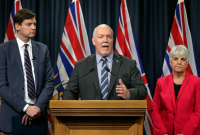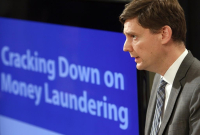Support strong Canadian climate journalism for 2025
The federal minister in charge of Canada's fight against money laundering supports British Columbia's public inquiry into dirty money but says a national examination is not necessary.
Organized Crime Reduction Minister Bill Blair said Tuesday money laundering is occurring across Canada and internationally, but the federal government has already started implementing measures to combat illegal money.
"From my perspective, we've already identified some very significant things that need to be done," he said. "It's been ongoing work. These types of measures, I think, will send a very clear message that Canada is cracking down."
Blair said the most recent federal budget included extra anti-money laundering spending for the RCMP, Canada's financial intelligence unit, the Financial Transactions and Reports Analysis Centre of Canada, and the creation of a task force to identify threats and loopholes.
The Canada Revenue Agency received funding to create four new residential and commercial real estate teams to hunt for money laundering in the property sector, he said. The government is also amending current anti-money laundering laws to better track who owns property and monitor property sales.
"We need to have a better understanding of who owns which corporations and who has money in there," said Blair. "If someone comes in with a hockey bag full of cash, you can't just pretend you're indifferent and don't know its origins. You have a responsibility of due diligence. For those who are reckless, there could be criminal consequences."
But the author of a recent C.D. Howe Institute report on money laundering says Canada is behind the times when it comes to fighting the crime.
Kevin Comeau's report, "Why We Fail to Catch Money Launderers 99.9 per cent of the Time," said Canada's anti-money laundering policies are among the weakest of Western democracies and billions are laundered in Canada annually.
"It's a 20th Century solution to a 21st Century problem," said Comeau in a telephone interview from Oakville, Ont.
The retired corporate lawyer said the amended federal legislation to track property ownership to discourage money laundering in the real estate sector is too weak because the valuable information to deter the flow of dirty money is not widely enough available.
"The whole idea of anti-money laundering is to shine as much light on it as possible so you can have other people viewing saying, 'Ah-ha, there's the bad guy'," said Comeau. "Anything less than a public registry is saying we don't want to bring it up to best standards."
British Columbia's government introduced legislation last month aimed at preventing tax evasion and money laundering by looking to identify anonymous property owners through a registry that will be public in 2020.
An independent report commissioned by the B.C. government concluded $7.4 billion was laundered in B.C. last year out of an estimated total of $47 billion across Canada. The report by former B.C. deputy attorney general Maureen Maloney said money laundering contributed to a five per cent increase in real estate values in the Metro Vancouver area in 2018.
A second report by former RCMP deputy commissioner Peter German said money laundering led to a frenzy of buying real estate.
B.C. Premier John Horgan called a public inquiry days after the release of the German and Maloney reports.
"I have assured them they will have our full co-operation in the conduct of their inquiry," said Blair. "This is not a victimless crime. This is a crime that affects all Canadians. It affects the quality of our lives. It's had an impact in B.C., but we can see its potential impact in other jurisdictions in Canada as well."





Comments